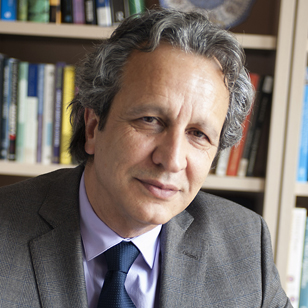
Hamid Ekbia
As the stay-at-home orders triggered by the coronavirus outbreak stretched week after week and month and after month, people took to social media to talk about their sense of isolation and how difficult they found it to be living in uncertain times.
Hamid Ekbia saw the outpouring of emotions and believed he might be able to help.
Ekbia is currently a professor of informatics, cognitive science, and international studies at the Luddy School of Informatics, Computing, and Engineering, but in the mid-1980s, he was a political prisoner in Iran where he spent 352 days in solitary confinement and another 18 months beyond that behind bars. He had been through social isolation before, and he wanted to share some techniques that helped him maintain his hope for a better future.
The result is “Solace in Solitude,” an article that appeared on the Los Angeles Review of Books website in early May. Ekbia describes his imprisoned past and how he used anchoring—a variety of methods that allow a person to maintain a connection to the world when they are isolated.
“I’ve been writing a memoir, and it’s a project that has been ongoing for a couple of years,” Ekbia said. “I felt like it’s related to the current moment. I had published another piece with the L.A. Review of Books, and I thought I would share my experience. I sent it to them, and it didn’t even take them an hour to say yes.”
The piece describes how Ekbia anchored himself by thinking of things that he had done in both the recent and remote past, such as playing with his son or a dinner he had with his family. Even as the days stretched on, the emotional power of those memories never waned. He also anchored himself through his environment. He saw the tip of a palm tree outside a small window near the 10-foot-high ceiling of his cell, and he heard cars going by. These small things reminded him of the presence of an outside world, one he was certain he would someday enjoy again.
He also made intellectual connections by reading poets and writers, maintaining a sense of human contact despite his imprisonment.
“When you lose contact with the world, whether it is social contact or being in our homes, we kind of start floating mentally, psychologically, and otherwise,” Ekbia said. “I use the notion of anchoring because in the same way ships and boats anchor themselves in the sea, we need to anchor ourselves into the reality of the world. There is life going on, a world that we need to connect to. Anchoring covers all of these different aspects relating to the world outside.”
Ekbia also reflects on the cultural differences in the interpretation of isolation. The Persian poet Rumi was a comfort to Ekbia through his writings about the angst and pain of separation from one’s roots and those who mean the most to the them. The American feeling of loneliness during isolation is similar to separation, but Ekbia believes a subtle shift in perspective from feeling lonely to instead feeling a sense of separation could be a comfort because the separation won’t last forever.
Although there is an obvious difference between being held for nearly a year in solitary confinement in an Iranian prison and having to stay home without the option of going to your restaurant of choice, Ekbia doesn’t minimize the impact of social isolation.
“Yes, life as a political prisoner is a much more gruesome experience, but what makes the current moment so dramatic is the scale of it,” Ekbia said. “There seems to be no end in sight, and the uncertainty of it is a big part. In my situation, I didn’t know when I was going to be released. I had a very different political view from the government. I wasn’t involved in violent activity or anything like that. I was imprisoned for my thoughts, and there wasn’t a sentence. They never told me until the very last moment when I would be released, and that created a lot of pain and angst.
“What I was trying to say in the article was that you can look ahead of the curve and say, ‘I know this isn’t going to go on forever. This will end.’ It’s all about being hopeful, but it’s also about remembering that you were somebody with a life and connections, and you will live that life again in time.”
“Solace in Solitude” is available on the Los Angeles Review of Books website.

